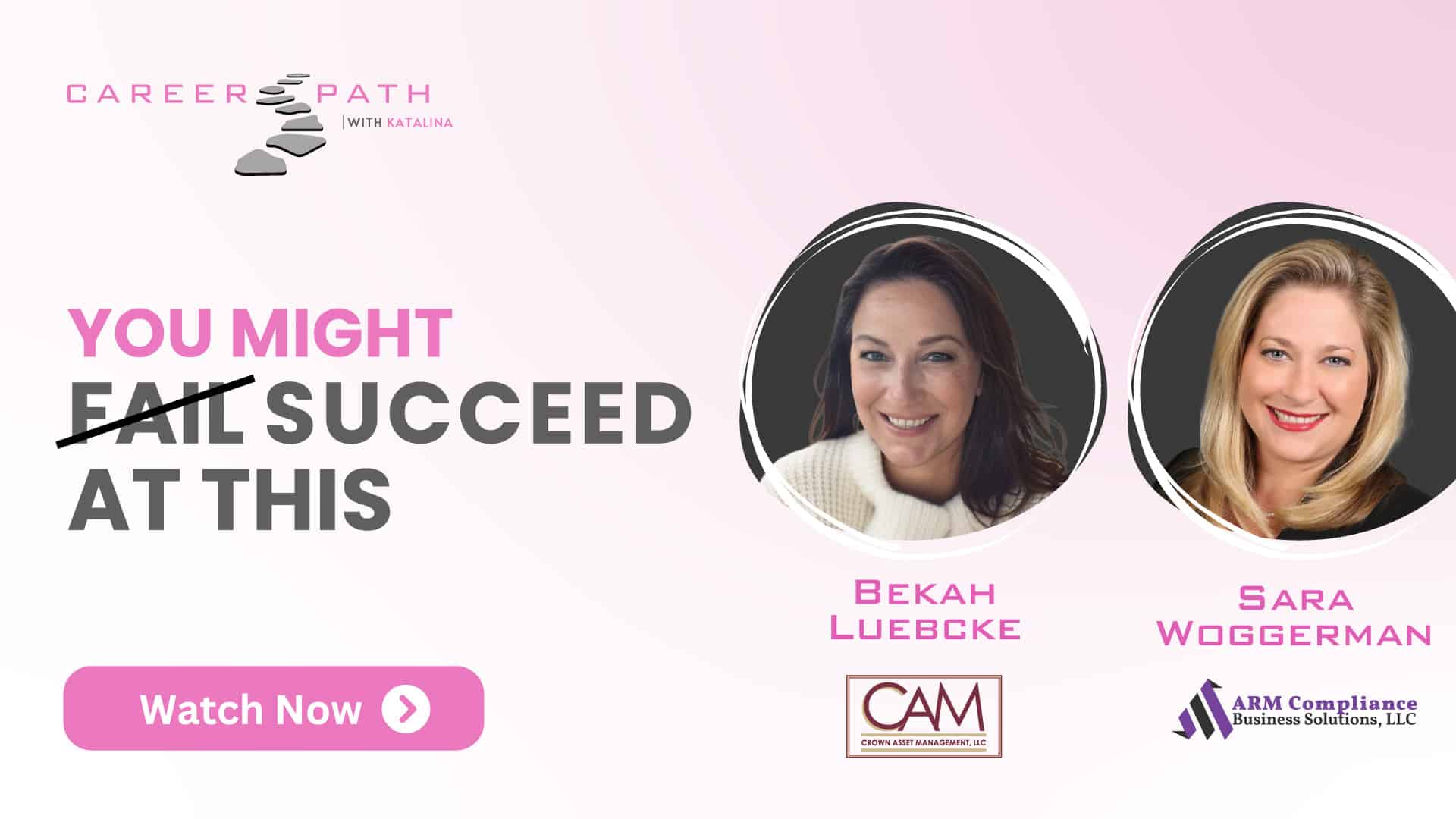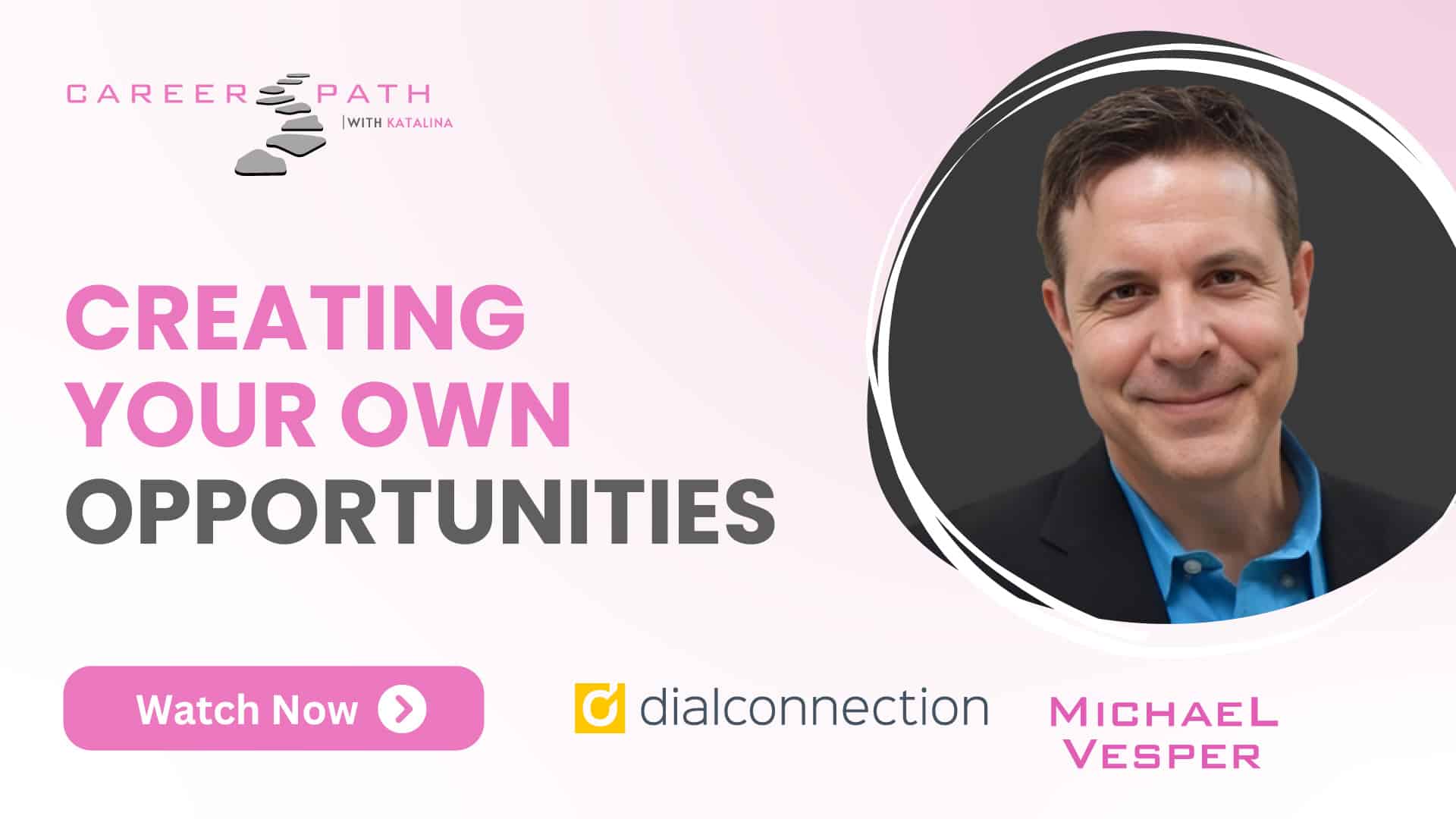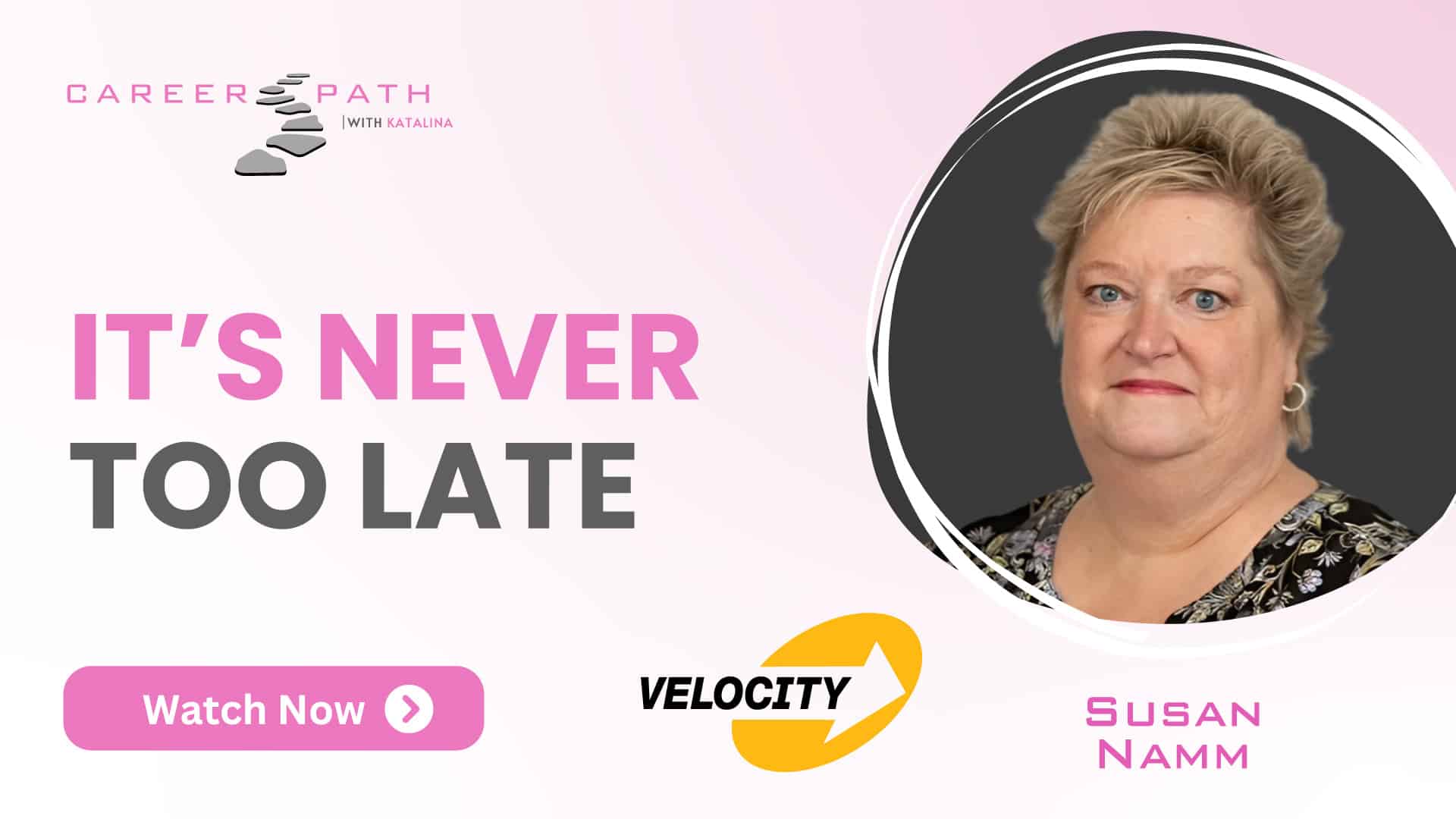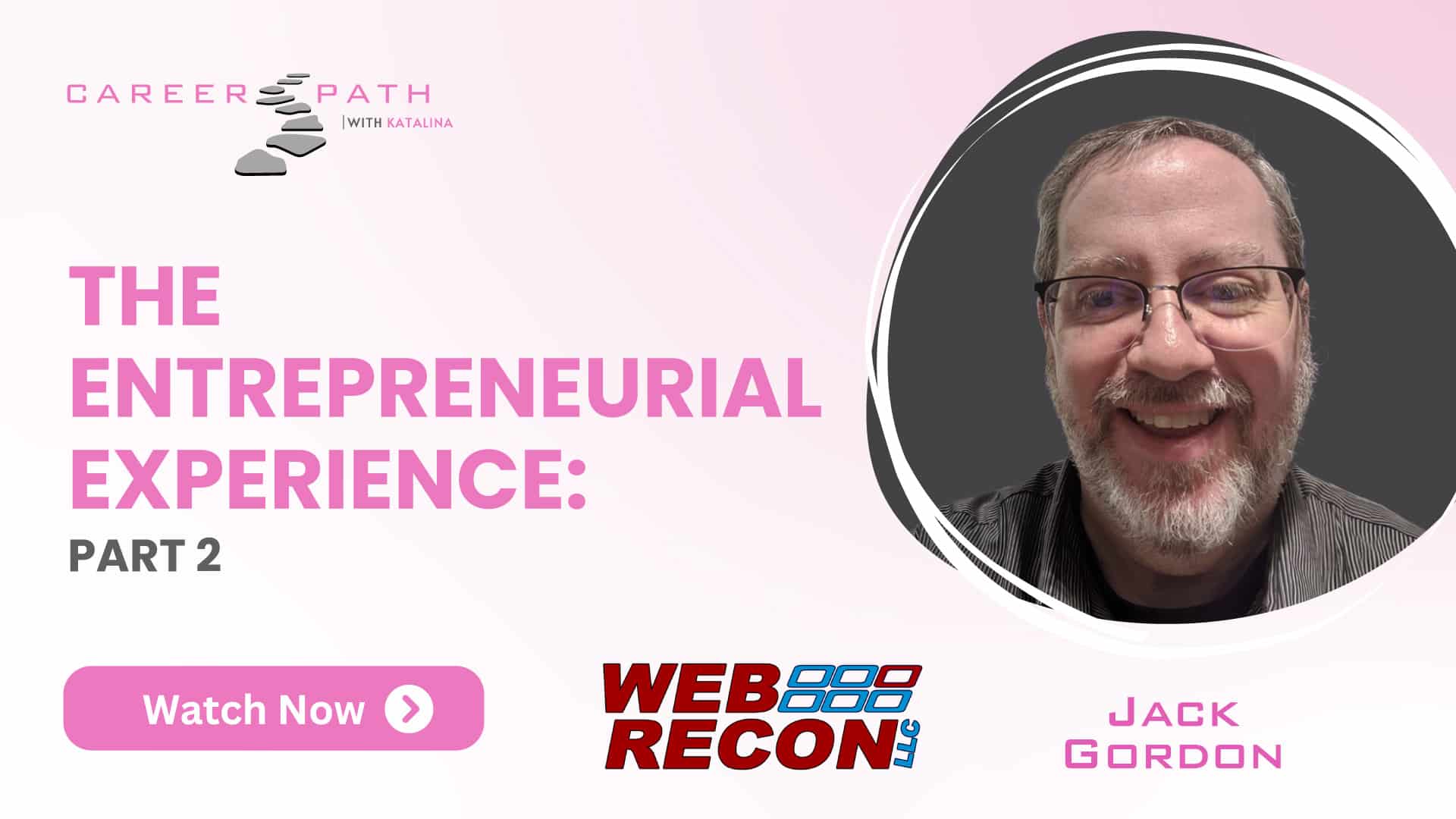Katalina Dawson (00:11)
Hi, and welcome back to another episode of Career Path. I am your host, Katalina. Today, our episode is titled, You Might Fail At This. And this is actually a very unique episode because it's kind of a part two to another episode I recently did with the incredible Sara Woggerman who will be on this episode with me as well. We did a topic.
diving deep into imposter syndrome a couple of episodes before. And it just resonated really well with people, resonated with me. mean, Sara and I, the whole reason we did it is we had an incredible conversation where we were both talking about our own experiences with it, which led to the episode, which led to so many people reaching out to both Sara and I saying, wow, that was such a great topic. But one of those people was Bekah Luebcke, the incredible OG because
Bekah was the first guest I have ever had on Career Path. So it is such an honor to have her joining us for this part two. Bekah reached out and said, hey guys, that was such an incredible topic to be covering. Let's go deeper. Let's talk some more about this. So it's kind of an imposter syndrome take two. You might fail at this or you may succeed at this. So for those of you who are not familiar with Sara and Bekah, I'm gonna give little intros.
Sara Woggerman is the Owner and President at ARM Compliance Business Solutions. And Bekah Luebcke is the Executive Vice President of Operations at Crown Asset Management. So it is such a pleasure to have you both back on. You guys are also the first two to do a repeat of this podcast. So it is super exciting to have you guys both on. Thank you so much.
Sara Woggerman (01:49)
it's a pleasure to be here.
Beka Luebcke (01:51)
Yeah, I'm very excited to be doing this again with the two of you.
Katalina Dawson (01:54)
Well, you guys know how this works. Normally I ask to tell a little bit about yourself and how you got to where you are today. But since you guys are repeat guests, you've already answered that question. I'm going to throw a curve ball out there. I want to hear something from each of you that sparks joy in your life, whether that be a child, a pet, a hobby, a workout routine, whatever it is. What is that thing that sparks joy? And can you tell us a little bit about that?
Bekah, since you were the first one ever on the podcast, let's start out with you.
Beka Luebcke (02:25)
So these days I am finding a ton of joy in the connections that I've been able to make, particularly throughout the industry over the years. I've been doing this for 20 something years now and I've made a lot of friends over the years. And I started a practice of doing happy hours with a couple of my women colleagues in the industry and we just kept it going over the years. And so right now that is something I very much look forward to when we get to have those sessions and just that opportunity to have so many great friendships in the industry. just makes the work that we do and you know how difficult it can be to manage our schedules and get on a plane time and time again. It just really fills my cup every time I get to reconnect with you guys and know, all of the exceptional people that we get the opportunity to connect with out in the industry.
Katalina Dawson (03:24)
Yeah, what a great way that you summed it up that fills my cup every time. I love that.
Beka Luebcke (03:28)
Yeah.
Sara Woggerman (03:29)
I love that so much too. And I, it actually feels so similar. I was thinking about, I mean, I actually reflect on this quite regularly, how I feel so blessed and lucky to have met the relationships that have sort of developed very specifically in the last five to seven years have been these industry relationships that have gone to another level they're my support system and a deep connection that is just very unique. And I really appreciate that so much about our industry. But to piggyback off that, so I don't say the same thing, of course, things that bring me joy. My two golden retrievers bring me joy every day. They make me smile because they're always happy and it doesn't matter what's happening. It doesn't matter what kind of mood I'm in. They're always happy and that is obviously joyful. My daughter makes me joyful. But I would say right now, because I have this small women only team, when I see my people, when that spark comes on and I see them like, okay, this is why we're doing what we're doing. And I've had a couple of moments recently where a few of our consultants have just really shined. And that just like, it's like the pride that I have as a mother when my daughter would do something that was, I'd be like, you're so brave, you went and you danced on stage on a solo performance. Like I'm so proud of you. I don't know that I could have done that at that age.
when I get to see, them sort of light up and their passion and I'm able to help facilitate that and give them a place for that. that brings me like incredible joy. Like it's, it's, it's not always about the paycheck. Of course, we all do this for a paycheck, but it's that value add that, is like, all right, we're doing a really good thing together.
Katalina Dawson (05:18)
That is truly beautiful, Sara. I love that so much. That's fantastic. Well, actually, Sara, would you like to kick us off? Because Bekah kicked us off with her sparking joy. Let's start with talking about the failure spiral, that unraveling. Because that was something we had touched on in our original episode with imposter syndrome.
Sara Woggerman (05:28)
Sure.
Yes, so I called it the spiral and I was using it to describe myself when I feel like all of a sudden I cannot, I feel like I can't control anything and things are spiraling and I am failing one way or another. Whether that is personally, professionally, I think this is an everyday feeling and it can hit any aspect of our life, right? And it's this fear that I'm not enough.
I am imperfect and I'm letting people down and do I tell people I'm letting them down? Right? it's a dangerous place to be. It really is. And it's, it's almost like it takes your breath away because you're just like, you almost hyperventilate with like fear all of a sudden. And it's like, where did this just come from? I suddenly can't deal with this issue because I'm spiraling. Right?
And so getting out of your head is really important. And that support system that both Bekah and I talked about within the industry has helped me with that a lot, right? Like sometimes just like, and it's not even me sharing the spiral or what I was having a fear of. It's sometimes just picking up the phone and saying, I'm having a rough day. And all of these things went wrong. And someone just saying to you,
Are you kidding me? I had something like this happen last week. And it just made me, you and so you feel not so alone, right? ⁓ Or just like, okay, all right, let's pull up our bootstraps. Like you got this, Sara. know, sometimes it's that. you know, having that safety in your support system to where, if you choose to be vulnerable about whatever it is you're fearing, or even when you're not sharing, they know.
Katalina Dawson (07:05)
Yeah.
Sara Woggerman (07:25)
and they can support you. That's really helped me with that specifically. Bekah, what do you think about that spiral?
Beka Luebcke (07:33)
So I actually, when I was listening to your original conversation, I had gotten some news that I knew was going to be particularly taxing to deal with on a personal level, but at the same time, I still had this big responsibility to show up at work for my team and still provide the support that they needed from me on a day-to-day basis. And you go through that inner dialogue of, wanting to just be human and be imperfect and not be the one in the in the hot seat and I like, how am I going to do this? How do I do this better than I've done it in the past? And there was a moment of, you know, just having confidence that I've trained mentally for this. I, you know, I do have a great practice to self-regulate and make sure that I'm showing up the best that I possibly can. But also I think a big thing has been learning that it's okay not to be perfect. And there are people who are going to allow you to fail and finding the right balance of vulnerability, that ability to ask for help and where can I ask for support in a way that's not oversharing and
Sara Woggerman (08:41)
Thanks
Okay.
Beka Luebcke (08:56)
not letting people too far behind the curtain of what I'm dealing with and making them feel responsible for taking care of me when it's my job to take care of them, but also knowing, okay, who can I lean on? Who do I have a slightly more personal relationship with? And I can share just enough that they know I may not show up for them quite as strong as I normally would and they're prepared to give me grace here.
Sara Woggerman (09:06)
you
Beka Luebcke (09:23)
And it's amazing what your support system looks like when you can activate it in that way. And then the other big thing that comes up for me, they lovingly name themselves my Hype Squad. we, have a group of two ladies and a guy that I'm in a constant text chain with and
Sara Woggerman (09:29)
huh.
Beka Luebcke (09:43)
We're constantly sharing things with each other about our lives and just whatever happens to come up. If it's a meme, a joke, a story, pictures from our travels. But also on the days that I just really feel like I suck or I'm not doing well, they always pump me back up. They come in and they tell me all of the things I need to hear or maybe even it's just something funny and petty that snaps me out of it and I can get right back into the right frame of line because it's not that big of a deal usually. You know, we're going to fail at things and that's just the way it is.
Katalina Dawson (10:19)
And I think Sara had put it to words very well where she said it's that feeling of not feeling so alone once you get back to that support system. Because especially today, I feel like so many of us feel so alone. People work remotely. a lot of just working off of screens and working on video calls. Then there's social media where it seems like, you you're not going to post all of your bad days on there. So everybody looks like they're having their best days all the time. And it can create such a disconnect because that's not reality. It's not necessarily fake either because a lot of times people are posting their actual triumphs, but they're only posting the triumphs, the good days, the vacations, the celebrations. So it's not necessarily fake, but it does make it feel.
Sara Woggerman (11:04)
Thanks.
Katalina Dawson (11:10)
Like, my gosh, if I'm not having a good time all the time, because I'm seeing everybody else have this good time, there is that sense of isolation and like I'm alone.
Sara Woggerman (11:18)
You have a tunnel into a picture tunnel into people's lives. I've heard people say like, they look like they always have like the most perfect marriage. And then I look and I go, well, my husband and I aren't, I was like, stop doing that because that is detrimental to your own relationship, right? Because you have no idea what really happens on all the days those pictures aren't being posted, right?
Katalina Dawson (11:23)
Yes.
Sara Woggerman (11:44)
They might not, you don't really know. you have, it's important to keep that in check. think that's a great way to, social media is such an interesting thing, because we're more connected, yet more isolated than ever, at the same time as a result of that specifically.
Katalina Dawson (11:58)
100%.
Beka Luebcke (12:02)
Well, and it's curated. We put what we want people to see out there. We're not going to put our worst pictures on social media. And the other thing I think is it's just the power of hearing somebody else say it. I've started calling it the cosmic algorithm. We joke around about the news feed and how Facebook learns through what it hears us say or what we're clicking on, reels that we're watching.
Katalina Dawson (12:02)
Yeah.
Beka Luebcke (12:29)
I find that as I go through life, like whatever's on my mind is what I hear. It's just like that analogy that if I tell you to look for the color red, you're going to see it in all the places you've never noticed it before. The same thing happens with whatever you're dealing with, whatever's on your mind. And I have found that in my rotation of podcasts that I listen to, the same themes come up over and over again. And it's just a never ending reminder that I am not alone.
Katalina Dawson (12:41)
Yeah.
Beka Luebcke (12:56)
I'm not the only person experiencing it and the power of feeling connected to somebody even if it's someone I will never meet that could be in a completely different part of the world. It just demystifies the situation and it makes it so much easier to deal with.
Absolutely. And I want go back to something that you had mentioned previously, Bekah, because I thought you hit the nail on the head so well that it's not just a fear of failure always. It can be a fear of imperfection. And I definitely suffer with that. And I had to just pull up one of my favorite quotes from Gary Vee. I love this quote so much. Anybody who watches the show knows I do a lot of quotes, but I wanted to quote it exactly. So I pulled it up and he says, The best way to not be scared of messing up is waking up knowing you're always going to mess up.
Sara Woggerman (13:47)
Yes.
Katalina Dawson (13:48)
And I think about this all the time and it really helps. Even if you just, you mess up or you get scared that you're gonna mess up and just think of that quote, you're always gonna mess up. Another one that's similar and I don't know who said it, said something like, hey, your first podcast is gonna suck. Your first book is gonna suck. Your first whatever is probably gonna suck. But if you don't get started, you're never gonna get to a place where things are actually gonna be great. Start today and like. Build that, don't be so afraid to put out something that's not absolutely perfect.
Sara Woggerman (14:19)
Yes. Yeah. And it's that's hard. So I was always since a child, I strived for this really bizarre perfection. I was definitely one of those people. Right. Like that was ingrained in me as a small child where I was trying to be whatever it was. And like it used to really frustrate my parents because if I wasn't perfect at a sport or something right away, be like, well, then I just can't, I mean, I can't do it. Like, and so that was, that was a lesson I needed to learn as a child, right? That you don't give up after that. But, I, I remember that being such a frustration point. And now, I don't give up obviously because I wouldn't be where I'm at right now, but it's like,
Sara Woggerman (15:06)
I can't fail, I can't fail, I can't fail. And sometimes you have to lean into the fail. You don't learn unless you fail. ⁓ It's kind of like when you're managing people, I know you manage people, Bekah, and you've got to let them sometimes fail. You can't stop them from failing. There's nothing that they're going to do that can be undone or that can't be undone, right? Like you learn from the failures and that's hard when you're in a leadership role sometimes because you're like, I know what that failure, I know that failure, sometimes.
Beka Luebcke (15:11)
Yeah. Yeah.
Yeah.
Yeah.
Sara Woggerman (15:35)
You have to let them so that they learn. Because when you fail, you never unlearn that lesson because it's ingrained in your brain so much, right? Like we all know a time when we have failed and been like, we will never make that mistake again.
Beka Luebcke (15:46)
I agree.
Yeah. And I think, I think perfection and control get really tied up with each other, you know, because we, we know the mistakes that our team, if they're what they're about to step in and, know, we can help mitigate it, but then we rob them of that loss. And it's not that different from helicopter parenting and right, you know, or, or participation trophies and all of those things, you know, that
Katalina Dawson (15:50)
yeah.
Sara Woggerman (15:55)
⁓ good point, yes.
I'm afraid.
Beka Luebcke (16:17)
Kids have to build that strength and we have to build that strength and learn from those lessons. And you know, it's about presence over perfection and being able to release that control because what if they try it differently than how you know to do it? They discover a new and better way. You know, so maybe they're going to fail and they're going to learn from that lesson, but maybe they're going to figure something out and
Sara Woggerman (16:45)
Right.
Beka Luebcke (16:45)
If you don't let go of that control, you don't know.
Sara Woggerman (16:51)
No, you're 100 % right. I think that's where, you know, millennials got a really bad rap for a long time. And I did a generational study and I actually spoke at the women's conference. It was year two of the women's conference about the generational divide. And it was specific to women, but it really isn't a gender specific thing, right? But it was that, you know, all the studies that I read and I analyzed for my little workshop, it had a lot to do with that, right? Is like, there's a way that we've been doing it for forever. We're trying, we're coming in with new ideas and that not being able to come together and kind of have that, okay, maybe you're going to figure out something new and maybe we can learn from each other. That was a fascinating thing for me to dive into.
Beka Luebcke (17:37)
Yeah, and look, I think that's the perfect example because there was a woman who worked for me a few years ago and it was very challenging in the beginning because she did want to bring some very different strategies to the table and it was different than the way we've it historically or the way my experience led me to want to do it. And as I learned to let go, And I learned to communicate with her in a way that we could understand each other and finding that balance. She's become one of my closest friends now and we don't work together any longer, but she's one of those Zoom calls that I do once a month. And, you know, we grow and learn from each other and share experiences and a lot of them are, very similar experiences. So there's that connection of.
Yeah, I'm dealing with that too and being able to share that experience and figure out how to fail through all of these things while supporting each other.
Sara Woggerman (18:39)
Yes.
Katalina Dawson (18:39)
I'm going to throw in another quote that I think perfectly goes along with this because it talks about both failing yourself and even kind of failing through another by like not knowing how to do things or they're doing something different. It's don't be afraid to start over again because this time you're not starting from scratch. You're starting from experience.
Beka Luebcke (19:02)
Yeah.
Katalina Dawson (19:02)
So whether it was you that failed, whether it was somebody else, now you've built a framework to really build on.
Sara Woggerman (19:08)
Yes.
Yes. I read that one quite often too. It's such a great reminder. Especially if you are having those moments where your self talk is telling you you're failing at something, right? that it's helps you just remember like, okay, so what if I fail? I'm going to start over and I'm going to do it better. Like that's how you do it, right?
Beka Luebcke (19:30)
Yeah. Yeah.
Katalina Dawson (19:30)
Yeah.
And something I want to make sure we touch on too is it can be very small things too. And it goes back to that perfectionism. Like something that we had talked about before was you're getting ready for a client call and you go, my gosh, this morning things were crazy in the house. I did not have time to put makeup on. And you can still get into that spiral, get into that just terrible mindset. Cause you're like, my gosh, I don't look good. I'm not professional. Nobody's going to take me seriously. And you can just end up tearing yourself apart over tiny, small things consistently.
Beka Luebcke (20:05)
Yeah, I really struggled around the end of the year to shift my mindset and that perspective. I realized that I was so focused on how other people see me and how do I get them to see me and it wasn't until I made that shift of how do I see myself. Am I making myself?
Am I doing this? Am I doing the best that I know I can do? Am I trying hard enough? Am I setting myself up for success? Am I living in alignment with my values? I really just took it back to what I knew because I really worked hard to understand what my core values are and stay mindful of them. And was like, isn't that what really matters? And today, if somebody is upset with me...
If I've failed somebody's expectations, what was my intent? Did I deliver on my intent? Did I do everything I could have to make sure that I was remaining aligned with my intent, remaining aligned with my values, and being kind? You know, just doing all of the things that we need to do to be good humans. But at end of the day, it's like this allowance that you're going to mess up something.
But are you doing it for the right reasons? you doing it in the right way? Are you doing the best you can and letting go of that control of those outcomes?
Sara Woggerman (21:37)
No, that's, I mean, you nailed it right there, Bekah. That was wonderful.
Katalina Dawson (21:38)
Yeah, absolutely.
Beka Luebcke (21:45)
You ⁓
Katalina Dawson (21:47)
And Bekah, can you actually dive a little bit deeper into something you were saying earlier, which I think so many people will resonate with. It's that idea of the spiral within leadership, especially when you don't want to make something else others problems. And there's that vulnerability in the leadership and how do you walk that line?
Beka Luebcke (22:06)
So are you speaking from the perspective of how do I get myself back into that position of strength? So that's really that resilience practice. And so I did a little quick session with Chat GPT this morning to get some prompts. And one of the things that it came up with was to train for regulation like it's a part of your job.
Katalina Dawson (22:14)
Yes, yes.
Beka Luebcke (22:33)
As a leader, of the things that I've realized is extremely important is to understand self-regulation, regulating your emotions, regulating how you fuel your body, how are you handling your responsiveness versus reactiveness. And there are so many things you can do to set yourself up for success here. And one of the things that I wrote down in preparation is There was this whole wave of self-care. doing this, I'm taking care of myself, I'm putting myself first. And I struggle with it because is it self-care or is it self-indulgence? And I think there's a difference, right? There are things that we do when we've had a bad day. Maybe we go have a drink a glass of wine, drink a bottle of wine. And is that self-care or is that self-indulgence? What's the outcome?
of what you're choosing to do to soothe yourself after you have found yourself in a stressful situation. I can choose to go have drinks with my friends and then I'm going to have a hangover the next morning and I am probably not going to show up my best for my team. Or I can know that if I go home and I get on the treadmill and I call a friend or I sit down and have a conversation.
with my husband and just have somebody supportive. Have a conversation with me. It can be about whatever I'm dealing with or it could just be a connection like that feeling of connection with somebody who cares about you. But what is going to fuel me and set me up to be able to show up and be thoughtful? And that's generally exercise, plenty of water. maybe some meditation. I might go sit in the sauna for a little while and a good night's sleep.
Katalina Dawson (24:21)
Yeah, it's grounding routines, it seems like. Things that just kind of get you back to you. ⁓ Something else that on the same kind of level that I do is I try to practice looking at how small my problems are sometimes. Because when you think it like right now, it seems like the biggest thing in the world. And we can think about this with like teenagers in a breakup. They think their world has ended. I've been there. I thought the world ended too.
Sara Woggerman (24:24)
Okay.
Beka Luebcke (24:24)
Yeah.
Sara Woggerman (24:27)
Ahem.
We all did, yeah.
Katalina Dawson (24:49)
and now we're like, that's so silly!
Sara Woggerman (24:50)
Why would
I carry on after this heartbreak? Like what? Anyways.
Katalina Dawson (24:54)
Exactly.
But now we probably all three of us look back at those moments and go, that was kind of silly because, that's because we have all this perspective. So you can practice the grounding, but you can also try to practice the perspective and realize that whatever this mistake is, or whatever this failure is, did it, did it ruin my life? Did it stop the world? The world is still spinning. The sun's still going to come up tomorrow. Like it's not.
Sara Woggerman (25:19)
Ahem.
Katalina Dawson (25:20)
as big of a deal as it may seem and just stopping and thinking about it in any way, shape or form that it makes you feel better, whether that's thinking about history, thinking about space, thinking about the trajectory of your life, but then realizing that, I made a mistake and that's actually very small in the entire realm of my life. And possibly if you're doing reflection as well as part of this, you might go, hey, this is actually smaller than mistakes I've made in the past.
And if I got through that, I can absolutely get through this today. Just ground yourself.
Sara Woggerman (25:53)
And I think it's equally important, all the things that we're talking about, to, I like to really own my mistakes. And I will apologize to people as a result of that, right? I think for me, I don't feel free of my mistake until I have said something like, guys, I really let you down on this. Like I didn't show up for you.
I had a boss once, I'll never forget it. It was, it was in my early days. And he picked up the phone and he called me and I was in a recoveries position and he started barking all these things about numbers, right? And I said, well, if you recall, and I was very calm. and then all of a sudden he stopped. He goes, I'm sorry. I should have said good morning. How are you, Sara first?
And I just started laughing because I was like, you're fine, right? Like, like just, but he recognized that he just like, I literally picked up the phone and said hello. And it was like, blah, blah, blah, blah, blah, blah, blah, And he owned it. And I appreciated that so much, right? And I think we've probably all had a scenario like that before, where it's like, I need, I didn't even say hello to you. I was just, I was one track minding it. And sometimes I can be in meetings and I hate it. I get so upset with myself.
When I catch myself doing this with my team and I'm getting distracted by something else and I'm not all it's like put away the phones. think we need to normalize shutting down our email and putting away our phone when we are one-on-one or we need to be engaged with people. There are a handful of people in this industry who I have noticed do intentionally put their phone down and away and will not like when we're at conferences, they don't look at it. I think.
Beka Luebcke (27:37)
Yeah.
Sara Woggerman (27:39)
You show up better when those distractions don't happen. And there's a lot of us with some form of ADHD, right? So it's hard for us to do that. But if we want to, that's when I feel like I have failed somebody the most, when I have to say, I am so sorry I got distracted. And I feel like something you just said was important. And I wasn't listening. Like, I'm like, I feel like a jerk, you know? Like I just that's not how I want to show up for my team or my people. so, I think, I think everyone probably can relate to that on some levels. So that's why I wanted to share that particular story. But whenever you do feel that you feel like you didn't show up being able to say, I, I apologize for not showing up with you yesterday. I had some things, and maybe this goes back to Bekah saying, you know, well, how much do you share? had some personal things that are going on.
but that's no excuse. Like today I've refocused. I'm back guys. Like, I'm sorry, you know, owning that. feel like people respond to that so well because they don't want us to be perfect either because that's an unachievable place to be. You are human when you can admit your mistakes and you lean into them and you say, wow, guys, I really jacked that up.
Katalina Dawson (28:48)
us.
Sara Woggerman (28:55)
you know, like whatever it was, right? Like I just really screwed that up. And it makes you again, more approachable. I think those are good leadership things. I think the absence of that is you're putting, you're not allowing anyone else to fail safely either.
Beka Luebcke (29:13)
Yeah, and look, if you can acknowledge those things, be human, and do it the right way, it's also a great opportunity for you to model healthy boundaries for your members. presence and really listening to somebody are probably two of the most valuable gifts that you can give anybody.
100%
Beka Luebcke (29:38)
you have that opportunity to feel a connection like when you actually look somebody in the eye and connect with them and really try to hear and understand what they're saying. Not only is it a more effective conversation, but you may walk away having gained something from that. Even if it was just a moment of real connection with somebody.
But I did want to circle back about the, you know, the things that have happened in the past. There's an author that I really love and she is constantly saying no big deal. Like whatever happened, no big deal. You had a great day. No big deal. You are training for a run and you had a personal best. No big deal. You might have a really crappy run tomorrow. But also the other end of it when things don't go well, it's not that big of a deal. Everything just a passing memory. And while it feels like everything right now in a few years, it's just a blip on the radar. And if you can reset your perspective, like you were saying, and accept that in the moment, then it can be everything. And you don't want to minimize. Like if you've done something, you want to own it. You want to take that account.
Katalina Dawson (30:42)
Yes.
Beka Luebcke (30:56)
You don't want to minimize what you've done. You don't want to not learn the lesson, but you also aren't going to benefit from punishing yourself over it. know, you all of your time beating yourself up. There's absolutely nothing to learn from it. And I think the other thing is for perspective is the gratitude practice. That is something
Beka Luebcke (31:19)
All of my life I know I've been terrible at saying thank you to people and it's a skill that I still actively have to try to cultivate. I don't think I'm great at it in person, but I have a really good journaling practice around gratitude and I found a form on Etsy and I fill it out every day and I hear people talk about how it's so hard to come up with five things that are genuine.
At the end of the day, if you can find gratitude for anything, even your stupid favorite pen or highlighter, that's something, that's a place to start. And you can only start where you are. finding the awe, I think Martha Beck, she's a psychologist or something. I've heard her on several podcasts and there was one in particular that was about learning to go back to awe over habituation.
Sara Woggerman (31:50)
Yeah, something. Yeah.
Beka Luebcke (32:10)
We just get so used to taking things for granted. And if you can stop and realize how amazing it is. And so, yeah, be grateful for that little thing. Be grateful for your favorite pen or your dog or the sandwich that your husband made for you. know, whatever it is, it's okay to be grateful for whatever brought you joy or happiness or comfort or ease that day. That was a great thing
for you and you can start that simple.
Katalina Dawson (32:41)
Yeah.
That's fantastic. We are running out of time. So I would love to make sure do either of you have any last thoughts you want to make sure you share? Because this is so great. And I feel like how did we already run out of time? Yes. So do either of you have any last thoughts that you want to make sure you share today?
Sara Woggerman (32:46)
I love that.
I know, I know we could keep doing this, right?
Beka Luebcke (33:05)
think the one thing that I just want to mention, it's the fake it till you make it mantra. I think that's an okay starting place, but ultimately when you lie to yourself and it doesn't feel real to you, your body knows that and it will keep up with that. So think of it more as practice and try to reframe it in your mind.
Because ultimately, we don't want to perform with each other. We want to be real. We want to connect. And so think of it as a practice and something that you can build on and a skill that you can cultivate. You don't have to fake it. You can be bad at it. And all you have to do is show up and try and give yourself grace to only be as good at it as you are right now. And the more you practice it, the better you will get at it. And eventually it will become easier and more natural.
Katalina Dawson (33:57)
Sara, did you
Sara Woggerman (33:57)
I love
I don't know if I can top that, Bekah. That was pretty good. I would say my final thoughts are something I said earlier, which is lean into your failures as true learning and development principles. you know, learn from them in a way of like, not only can I learn to handle something better or do something better. It's also how can I now support other people so that they don't feel that way or that they feel safe so that they can fail? ⁓ And they're not going to go through glass, they're going to hit a pillow, right? That was something when I was raising my daughter, it was like, I know I need to let her feel this and fail at this. I just wanna make the landing a little softer for her. I don't want her to be all bruised up, but...
Sara Woggerman (34:46)
Sometimes they're gonna get all bruised up and it's just, it is part of the process. And then your job as a leader is then to be like, okay, now we stand back up and now we, you what are the perspectives and the lessons and how can we recover from this? I think that that is, and when they succeed, like when they get better, make sure you're letting them know. Like that is also the thing, like.
I have seen you go from this to this in this time period, and I think you're a rock star. Like making sure to be other people's hype person and be authentic about it. Don't just do it to do it, right? But like that is such an amazing skill to continue to cultivate and an important one.
Beka Luebcke (35:33)
And I think it's easier to show appreciation in some instance, you know, to be able to cite something specific and say, I really love the way you do that. It's just easier to me than saying thank you for whatever reason.
Sara Woggerman (35:48)
Yes.
Yes. I love that you always do X, Y, and Z. like, I know I can always depend on you to be the very best at this. Like, I mean, it's, I do very intentionally do that with my team now. I don't know that I always did that in leadership. That's definitely something I've learned over the years. But it's so meaningful when I hear Other people tell me like this person really, it sticks with people. Like it's the thing that will stick with you. You never know when those words are going to be the transformation in someone else. And I always like love that because there's been people who have done that for me. so.
Katalina Dawson (36:17)
Good.
Thank you both, my gosh, I love all this input. You guys have such incredible stories to tell and I just love your insights and your experience. Thank you both so much.
Sara Woggerman (36:41)
Thank for having us.
Beka Luebcke (36:42)
Yes, thank you for letting me invite myself to your little party.
Katalina Dawson (36:45)
my gosh, it was the easiest thing ever. Bekah, you want to come back again? You are already welcome. I'm welcoming you right now. Yeah. And you, Sara, both of you are welcome. Like anytime, if you have a topic you want to cover, you guys are so welcome back. I'm sure our audience would love to have you. I do want to end with one more quote. It's the last one on this episode, I swear. But the quote is, the master has failed more times than the beginner has tried.
Sara Woggerman (36:50)
I'll speak with you anytime, anytime.
Yup.
Katalina Dawson (37:12)
So go ahead and start with doubt. You've got this. Those are the last words I want to end with. Thank you. So to our listeners, if you have any comments, questions, any episode topics you want to see, and especially if you want to see Sara and Bekah back, leave it in the comments below. We'll thumbs up all those comments. And we look forward to seeing you in the next episode. Bye.
Sara Woggerman (37:16)
Love it.
Beka Luebcke (37:18)
That's awesome.
















